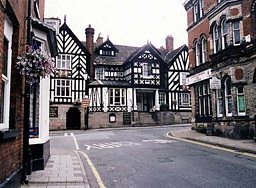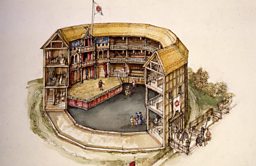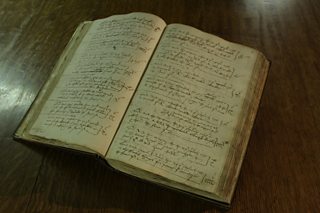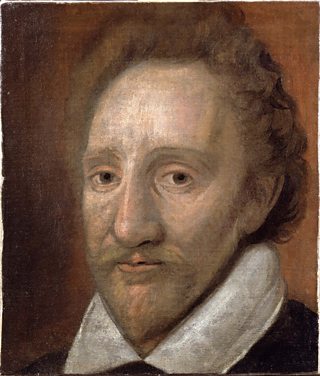Small Cheshire town attracts Shakespeare's players
It may be a surprise that a small Cheshire market town on the River Dane near the foothills of the Pennines was a regular stop on the tour route north for Shakespeare’s acting company, The King’s Men, for nearly twenty years.
Between 1614 and 1633, the company seemed to have had a taste for a northern tour later in the year or in the early spring, taking in the market town of Congleton.
-
![]()
Much ado near me
Hear more Shakespeare stories on BBC Radio Manchester
-
![]()
Shakespeare Festival 2016
The BBC celebrates the genius of the bard

Although Shakespeare would never have joined them on the road at this late stage in his writing and acting career, there is no doubt that some of his plays would have been in the provincial repertory, and that his experienced troupe of actors would have joined the tour.
The history plays especially would have had appeal, given featured members of the northern nobility such as Thomas Stanley, Earl of Derby (Richard III, revived at court in 1633) and the Percy Earls of Northumberland (Henry IV, Pt 1, revived at court, 1612-13, 1625).
‘Come, bustle, bustle; caparison my horse. Call up Lord Stanley, bid him bring his power: I will lead forth my soldiers to the plain, And thus my battle shall be ordered:’Richard III, Act V, Scene 3
The Swan in Congleton was an important inn with a half-timbered facade set at an imposing height on West Street, a main road winding through the town to the left off High Street. During the period of Jacobean and Caroline performance the inn was owned by Randall Rode, mayor of Congleton in 1606–8, 1621–2, 1633-4 and 1635-6. By the 18th century the Swan, renamed the Lion and Swan, became Congleton's principal coaching inn.
The present 2-storey inn is heavily restored and was mostly rebuilt and extended in the 19th century in brick to include a stable block and coach house. New gables were added on either side of the central front. A section of 16th century wattle and daub fabric and load-bearing timbers remain on the ground floor in the central core. No inn-yard survives though there is a deep car park to the right of the inn.
The King’s Men first appeared between 25 December 1614 and 24 March in 1615. They returned twice in the autumn of 1620, early in 1623 and then again in November the same year. Four more trips north through Congleton were made in 1627 (December), sometime in 1630-1, and spring 1633, the reward typically 10s - the town was consistent in its level of payment, but not lavish.
By Sally-Beth MacLean, General Editor, Records of Early English Drama
The North West's influence on Shakespeare's success
A group of Northern-based Elizabethan performers who originally went by the name of Lord Strange’s Men played a prominent role in the success of Shakespeare’s early acting career.
It was in the late 1580s and early 1590s that Lord Strange’s Men were to make their mark, as they set their sights on success in London… and the new Rose Theatre.
Lord Strange’s Men (pronounced strang) began life as a troupe of acrobats under the patronage of the Stanley family, headed by the Earl of Derby, who had homes in Lancashire and near Liverpool.
Later in the 1580s Lord Strange patronized a new troupe, this time of actors – including William Kemp (who was to go on to become Shakespeare’s ‘clown’), Thomas Pope and George Bryan.
It was in the late 1580s and early 1590s that Lord Strange’s Men were to make their mark, as they set their sights on success in London… and the new Rose Theatre.
The Rose playhouse was the first purpose-built theatre south of the Thames to be located on Bankside, Southwark.
The playhouse was erected by Philip Henslowe in 1587 and functioned for a couple of decades on the north side of Maiden Lane (now Park Street).

Lord Strange's Men at The Rose
The first acting company known to have been in residence at The Rose was Lord Strange’s Men, who had won themselves a reputation as an innovative and talented troupe under the patronage of Ferdinando Stanley, Lord Strange, the heir of the 4th Earl of Derby.

Thanks to the unique survival of the journal known as Henslowe’s Diary we can track the performances (and receipts) by play at The Rose during two seasons when Strange’s Men maintained residence (from 19 February-22 June 1592, and again from 29 December 1592-1 February 1593). Actor Edward Alleyn was the star performer, and although we have no actual record that Shakespeare himself was a member of Strange’s Men, it is possible that he was indeed one of their hired actors at the time, as well as a contributing playwright.
Will Kempe, Thomas Pope and George Bryan, three leading members of Strange’s Men, migrated to join Shakespeare and Richard Burbage in the newly formed Chamberlain’s Men after the sudden death of their patron, Ferdinando Stanley (briefly 5th Earl of Derby) in the spring of 1594.
All three would have been known to Shakespeare already, at least as actors in Henry VI, Part I during their heyday with Strange’s Men.
This Northern connection is still in evidence years later, when in 1614 (Shakespeare is still alive and retired to Stratford-upon-Avon by this time) the Bard’s company, now known as The King’s Men, return to the North West to perform alongside the Earl of Derby’s troupe in a Cheshire Inn.
Shakespeare on Tour
From the moment they were written through to the present day, Shakespeare’s plays have continued to enthral and inspire audiences. They’ve been performed in venues big and small – including inns, private houses and emerging provincial theatres.

BBC English Regions is building a digital picture which tracks some of the many iconic moments across the country as we follow the ‘explosion’ in the performance of The Bard’s plays, from his own lifetime to recent times.
Drawing on fascinating new research from Records of Early English Drama (REED), plus the British Library's extensive collection of playbills, as well as expertise from De Montfort University and the Arts and Humanities Research Council, Shakespeare on Tour is a unique timeline of iconic moments of those performances, starting with his own troupe of actors, to highlights from more recent times. Listen out for stories on Shakespeare’s legacy on your BBC Local Radio station from Monday 21 March, 2016.
You never know - you might find evidence of Shakespeare’s footsteps close to home…
Craig Henderson, BBC English Regions
Just who were the King's men?
The King’s Men were the acting company in which Shakespeare was a member for most of his writing and acting career.

They were known as The Lord Chamberlain’s Men during the reign of Elizabeth I and become The King’s Men by the royal decree of King James I when he came to power in 1603.
In the royal patent of 1603, The King’s Men were named as – Lawrence Fletcher, William Shakespeare, Richard Burbage, Augustine Phillips, John Heminges, Henry Condell, William Sly, Robert Armin, Richard Cowley… ”and the rest of their associates…”.
By the time of the troupe’s visit to Congleton in 1614/15, several of the actors named in the patent had already died.
But lead actor Richard Burbage, who played Shakespeare’s demanding male parts – Richard III, Othello, King Lear, Antony and Macbeth – never retired from the stage and continued acting until his death in 1619.
Cheshire and the artistic earl
Records show that Shakespeare’s premier acting troupe, The King’s Men, performed alongside another group of actors under the patronage of the Earl of Derby. On two occasions the King’s Men were paid jointly with the Earl of Derby’s Men, one of the most active playing troupes circulating in the north.
Between 1 November 1620 and 30 January 1621 and then again on 14 December 1623 they are named together in the accounts. The performance in 1623 is known to have taken place at the Swan Inn in Congleton, and was likely to have taken place indoors, especially given the date late in the autumn.
William Stanley, the 6th Earl of Derby, was an enthusiastic patron. When he inherited the earldom from his brother Ferdinando in 1594 he started up his own troupe (by early summer 1594 the core of the Derby’s star company had migrated to join Shakespeare and Richard Burbage among others to form the new Lord Chamberlain’s Men).
Stanley may even have written some plays for his troupe: in 1599 a letter written by the Jesuit spy, George Fennor, reported that Earl William was ‘busye in penning comedyes for the common players.’ Certainly as actors constantly circulating locally, they were available to expand the performance capacity of other professional companies on tour so The King’s Men were not alone in joining forces with Derby’s Men.
-
![]()
Shakespeare Lives
The nation’s greatest performing arts institutions mark 400 years since the Bard's death
Related Links
Shakespeare on Tour: Around Manchester
-
![]()
Manchester gets a Theatre Royal
Manchester finally got its own Theatre Royal by royal patent in 1775
-
![]()
The Tempest adapted in Manchester
Turbulent times in the early 1800s as The Tempest hits Manchester
-
![]()
Child acting sensation Master Betty on stage in Manchester
Master Betty plays Macbeth in Manchester
Shakespeare on Tour: Around the country
-
![]()
Ira Aldridge
Ira Aldridge - the first black Shakespearean actor
-
![]()
Blossoming at the Rose Theatre
Shakespeare, budding playwright and actor, at the Rose Theatre from the spring of 1592
-
![]()
Will Kemp dance finished in Norwich
Why did Will Kemp, Shakespeare's former clown, dance from London to Norwich?
-
![]()
London's Female Romeo
Charlotte Cushman, the American actress who took Victorian London by storm










